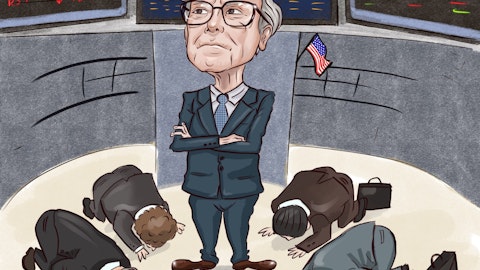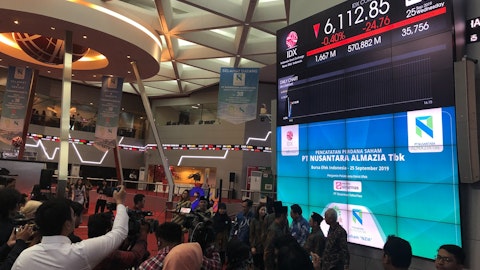Jiong Shao: I have a question about shareholder return. It’s great you increased the buyback by RMB25 billion. But in terms of the pace of the buyback, we understand there are constraints and the limitations such as capital control. Could you talk about sort of the cash you may already have outside of China? What needs to happen for you, so you may be able to pick up the pace of the buyback? And related to that, any update on the potential IPOs of Freshippo and Trendyol. Thank you very much.
Toby Xu: Okay. Thank you for your question. I will take the first one and Joe will take the second one. For the share buyback and the preparation of the offshore cash, I think for us, firstly, as you can see, we have — really have a sort of a very strong balance sheet in terms of cash and a certain percentage of the cash actually is sitting offshore, which we can use to do the buyback. On the other hand, we also have a good channel that we can dividend be cash out to offshore that we can further leverage either to make investments in our offshore businesses as well as using those sort of cash to do the buyback. And secondly, actually, we are sort of like very underleveraged. If you look at the balance sheet, actually, the better is only a very small amount of data.
And we can do if we need it, we can increase the leverage also to sort of get sufficient cash for us to do the share buyback. So as I said in my script, we are targeting to reduce — to have a net reduction of share count at least 3% every year in the next three fiscal years.
Joe Tsai: Okay. I’ll address the question about the IPO of Ele.me and Cainiao. So last year, when we announced our reorganization, part of the goal was to make sure that we take steps to reflect the intrinsic value of our various business units in the valuation of Alibaba Group, okay? And there are multiple ways we could do it. And we specifically talked about spinning off companies and raising capital in business units like Ele.me and Cainiao so that we could put a valuation mark on these businesses. But the caveat when we made the announcement was that all these transactions were subject to market conditions. And market conditions currently are just not in a state where we believe we can really truly reflect value — true intrinsic value of these businesses.
So in the last few months, Eddie and his team have taken a very close look at our core business, and we’ve come to the conclusion that right now, focusing on generating synergies within the companies in our group will be the best way to reflect the value of the entire Alibaba Group. We’re very excited about the potential for value creation through close collaboration among our businesses. In several areas, we have formed special project teams to ensure synergy creation and we believe prioritizing synergies to strengthen our core business is the best value-maximizing path today. Having said that, we continue to explore value creation through separate financings of our business units, but given the challenging market conditions, as I said, we’re not in a hurry on the timing of these transactions.
Rob Lin: Next question?
Operator: Your next question comes from Kenneth Fong with UBS. Please go ahead.
Kenneth Fong: I have a question on investment and return. We recorded on one hand we will continue to invest in TTG overseas area for growth. But on the other hand, in our last earnings call, we also aim to improve the ROIC for the group from single digit to double digit over time. So I want to ask about, let’s say, on the numerator front, what are the segments that we see room for improvement in terms of return and then the pace that we should expect? And on the denominator side being asset-light what are the progress and strategy for the disposal of non-core assets
Toby Xu: Thank you, Kenneth. I’ll take the first part of your question. As we said, I think as a listed company, I think it’s important to improve the ROIC to the investors. So that’s why during the last quarter’s earnings call, we committed that we will improve our ROIC from single digit to double digit in the next couple of years. However, the improvement on the ROIC doesn’t conflict with the investment we are going to make because making investments exactly is for the growth and for the future return of this growth eventually will also help to improve the ROIC. What we would be doing differently from previously is that we will be more focused on the core businesses, as elaborated previously by Eddie. So we will focus on only the e-commerce, which is including the onshore and offshore e-commerce business as well as cloud computing.
So those are the areas, as I was emphasized in my script, rule-making investments. Okay. And Joe will cover the — say from some of the non-core asset investments.
Joe Tsai: Yes. I’ll talk about the sale of non-core assets since this is a major focus of the capital management committee and I chair the capital management committee. We’re making very good progress on non-core asset sales. So during fiscal ’24 to date, so we’re nine months into this fiscal year, we have exited RMB1.7 billion in non-core investments, right? And so that’s a pretty good pace. And we’re very, very active in looking at our listed securities, and we form a special team to execute capital markets, sales transactions to get out of these listed securities. Now in addition, Toby has referred to this. We have a number of traditional physical retail businesses on our balance sheet, and these are not our core focus. It will make — it makes sense for us to exit these businesses, but this will take time given the challenging market conditions, but we’ll continue to work on it.





